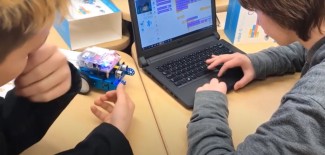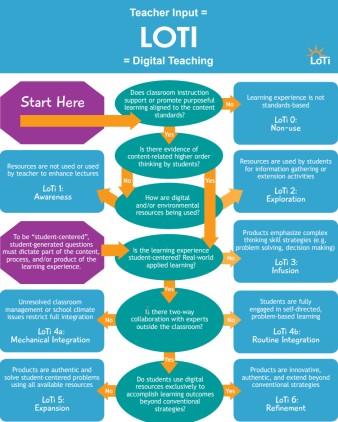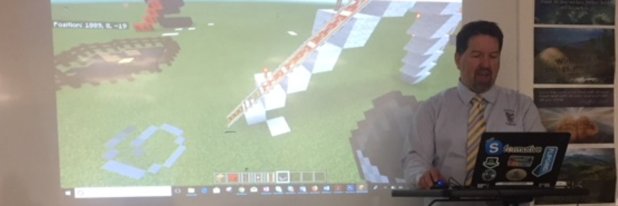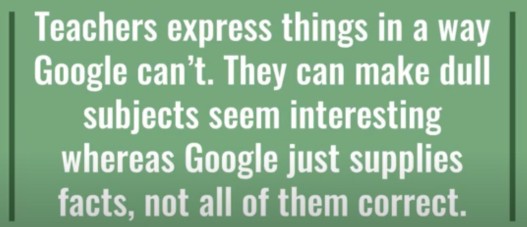This post was co-written with Lisa Frazer and also appears on her blog.
VS
Schools should not focus on teaching things that can be easily googled.
Our debate was on Thursday, and due to the double negative, we both argued the same side of the debate (the best side). We based our argument around the Levels of Teaching Innovation (LoTi) model as we feel strongly that this is the type of classroom that is needed in the 21st century in order for students to become the best lifelong learners they can be.
Daina and Jocelyn brought up some key points as well. Some fit in with our argument. The first being that Google does not expose students to the learning process which is what we based our whole argument on. They also added that students would not be motivated to remember information as easily because they have such quick, easy access to it with google. They then went on to state that students needed to get “Back to the Basics” but then brought up a very valid point, “What are the Basics”?
They stated one very specific key point that we feel should be the key assessment piece in learning— “If you can explain it, you understand it”. This led to a discussion on what assessment should look like. We feel that authentic assessment should be based around a conversation piece with a student in a conference-style manner or small group where students can explain their learning in multiple ways. Traditional teaching models do not necessarily fit this mold as students tend to just regurgitate information without really understanding. Therefore, they are not involved in the learning process.
Our research also found that 21st-century skills favor student-centered work, such as problem-based learning, project-based learning, and hands-on learning. The LoTi model places great importance on ensuring that learning is student-centered and therefore students are exposed to the learning process.
We read the book Why Do I Need a Teacher When I’ve Got Google by Ian Gilbert. This book highlights the need for students to inadvertently learn the 6 skills (Positivity, Bravery, Determination, Self-Belief, Creativity, and Sheer Energy) that will enable them to be well-rounded individuals. Google cannot teach any of these skills. These skills can be taught in a 21st-century classroom using a model such as LoTi (Levels of Teaching Innovation) where technology is only APART of the learning.
The LoTi Framework focuses on the balance of assessment, instruction and effective use of digital as well as other essential resources to promote the essential skills of higher-order thinking, engaged student learning, and authentic assessment practices. The framework allows educators to ensure the learning process automatically flows. Teachers can reflect on their teaching practice to promote student-directed learning as opposed to teacher-directed learning.
It is crucial that students be involved in the learning process and dig into their learning using the 4 C’s (Critical Thinking, Collaboration, Communication, and Creativity).
- Critical Thinking – empowers students to discover the truth, and separating fact from opinion.
- Creativity – thinking outside the box. This means looking at a problem from multiple perspectives, including those that others might not see.
- Collaboration – virtually every job requires you to work with people, this skill is something that you cannot find from the internet.
- Communication – In the age of text-based communication, it is so important for students to learn how to convey their thoughts in a way that others understand them.
We argue the importance of the teacher as a facilitator of learning. A 21st-century teacher is now becoming a facilitator or the guide to help the students in their learning. This means shifting roles from a lecturer to a facilitator who provides resources, monitors progress, and encourages students to solve a problem. They help the student in the learning process to guide students to be able to apply the learning in real-life situations, making the learning meaningful and relevant. If the learning is meaningful, they will remember it, know when to apply it, how to put it together, and once practiced students can get creative with it.
We also argue the point that learning should be multi-sensory. We have 5 senses in which we can learn and each person learns a different way or a multitude of ways. Learning becomes much more tactile when you can see it, touch it, manipulate it in a multitude of ways. Real-life applications such as hands-on learning or land-based learning where students take ownership of their learning by doing things such as planting a garden is a much more relevant and beneficial way to learn. Students develop so many more skills through this type of process rather than to just learn about the plants themselves through googling it.
We stated the importance of deepening the learning process by utilizing experts such as elders, knowledge keepers, support experts, professionals, community members in the classroom. This process enables mastery of subjects while also providing students relevance to their own learning. It is also beneficial to students as they are exposed to positive role models in their community.
In Conclusion:





Great post Curtis and Lisa! You guys did a great job at defending your point of view, which I totally agree with. Google is a tool! It should’t replace the teacher!
Is that Dean in the picture? Haha
Yes! (Taken with permission) 🙂
The whole message behind your debate was really refreshing to hear. I specifically appreciate your conclusion statement, and how that teachers are able to bring excitement to the classroom, and that there are important skills that Google can not teach students. Excellent job.